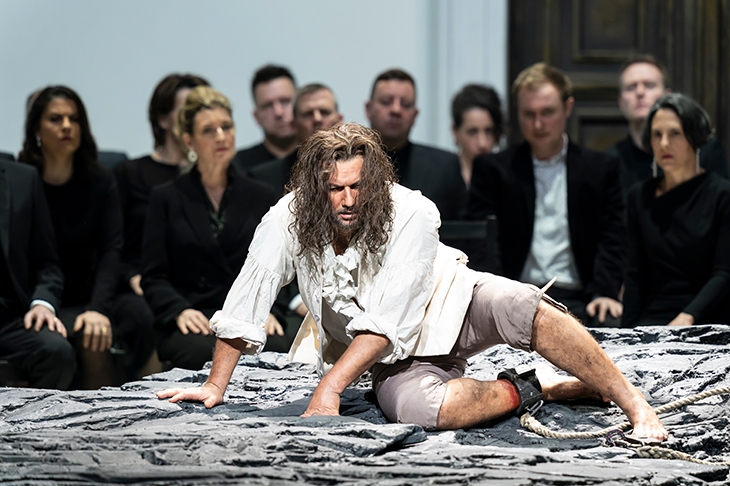‘People may say I can’t sing,’ said the soprano Florence Foster Jenkins, ‘but no one can ever say I didn’t sing.’ There were groans of dismay as an official walked out before the start of the Royal Opera’s new Fidelio: Jonas Kaufmann was not feeling on top form, but he was going to perform the role of Florestan regardless, and begged our indulgence. The mind plays tricks and after an announcement like that it’s hard to be entirely sure whether you’re hearing a skilfully proportioned interpretation or a singer dialling it down. But let the record show that Kaufmann did sing, and if you’ve booked for this production on the strength of that magic name alone, you can breathe easy.
And indisposed or not, there’s no mistaking that endless, unfurling stream of black-and-gold tenor tone. The stupendous crescendo on Kaufmann’s very first word — ‘Gott!’ — might have been the single most gripping sound in the whole show. Which is saying something when a cast includes Lise Davidsen as Leonore: a singer whose top notes are like staring directly at the sun, and whose unforced personal magnetism makes the role’s cross-dressing disguise wholly convincing. You could see why Marzelline (Amanda Forsythe) might have a crush on this strapping, compassionate young man, and Forsythe’s bright, brave performance was the centre of a well-characterised ensemble. Georg Zeppenfeld was a believably troubled Rocco, and Simon Neal’s clenched, black-browed Pizarro sang in cross-hatched shades of grey.
If your instinct is to undermine Beethoven, you should probably bedirecting a different opera
Antonio Pappano conducted attractively enough, and throughout Act One we might have been looking at a decent, if sluggish, revival of a 40-year-old historic staging. Director Tobias Kratzer sets Act One in revolutionary France, with naturalistic designs and a walk-on part for a horse. It looks good, and it works well: when Pizarro quietly invokes the Law of Suspects (Kratzer has adapted the spoken dialogue to suit his concept), the sense of enveloping, oppressive evil that it generates more than offsets the mounting number of inconsistencies — mostly caused by Kratzer’s attempts to rewrite the role of Marzelline in line with 21st-century standards of feistiness (she’s unbuttoning Fidelio’s breeches in no time).
Then comes Act Two, and Florestan has been sucked into a parallel dimension: a white abstract space where Kaufmann’s writhing and emoting is coolly surveyed by massed ranks of people in business suits. He gesticulates, they recoil. But mostly they just sit there. And just as you’ve managed to screen them out — the better to focus on one of the most intensely heartfelt, genuinely dramatic scenes that Beethoven ever created — Kratzer starts projecting their faces, ten-foot high, on the back wall of the set. In the foreground, Zeppenfeld, Davidsen and Kaufmann are exploring the outer reaches of hope and despair. But you’re just trying to pull your eyes away from some chin-stroking random. Love? Courage? Brotherhood? Oh wow, that bloke’s having a swig of Evian.
Yes, it’s our old pal the Alienation Effect and by the time Marzelline rocks up with a pistol, spouting chunks of Grillparzer’s funeral oration for Beethoven, I certainly felt alienated. Kratzer explains his thinking in the programme: this isn’t one opera at all, but a ‘melodrama on freedom and love in the post-Revolutionary era’ followed by (seriously) ‘a political essay on the responsibility of the individual in the face of a silent majority’. Beethoven, for what it’s worth, said Fidelio was about married love. No reason why it can’t be all these things, of course, but it needs to cohere on some level and if, faced with Beethoven’s blazing final affirmation, your instinct is to undermine him, you should probably be directing a different opera. This Fidelio contains some interesting ideas and a couple of borderline-great performances. They’re not enough.
Over at the Barbican the LSO, the London Adventist Chorale and a huge community choir dispensed pure joy. The American composer André J. Thomas conducted music from the Gospel tradition, introducing each item with a potted history of the genre and its roots. The choral singers, in multicoloured shirts, spilled halfway up the stalls; meanwhile soloists NaGuanda Nobles and Jason Dungee wheeled above the flood-tide of sound with the kind of uninhibited, improvisatory vocal freedom that Mozart and Haydn surely had in mind when they wrote their sacred music.
Most of the second half was devoted to a recent Mass by Thomas himself — and until you’ve heard the Credo sung in a fast funk tempo with silken orchestrations straight out of Quincy Jones, or witnessed the Resurrection set to a blissed-out cocktail piano, you wouldn’t believe that liturgy could carry such conviction. Ken Burton’s London Adventist Chorale sang with a focus and generosity that seemed to overflow from some wellspring of music at its freshest and most life-affirming. No one ever wished a mass setting longer; this might be the exception.






Comments